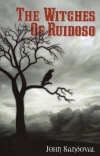The Witches of Ruidoso
“The earth is much like a train with a destination unknown,” Beth Delilah tells boyfriend Elijah in The Witches of Ruidoso. Sadly, author John Sandoval’s journey ended with his death in 2011, making this his first and only novel. His bittersweet YA romance showed promise of him becoming an original storyteller.
“The earth is much like a train with a destination unknown,” Beth Delilah tells boyfriend Elijah in The Witches of Ruidoso. Sadly, author John Sandoval’s journey ended with his death in 2011, making this his first and only novel. His bittersweet YA romance showed promise of him becoming an original storyteller.
With a pleasant, conversational voice, the now 95-year-old Elijah recalls his teenage years in the New Mexican territory. Sandoval makes it clear that there was nothing romantic about the West of 1895. His narrator notes the dual mythologies of Billy the Kid (showing “no signs of failing health”) and La Llorona (showing “no signs of wear and tear” as she continues looking for her dead child) that have grown up around him during his long life. While this particular western does not have gunfights, death is a prevalent presence (both Elijah and Beth Delilah are motherless), white settlers share uneasy relationships with their indigenous Mexican and Native American neighbors and the Civil War is a fresh, daily memory of pain for its veterans.
The other danger is child abuse. This issue is non-existent and non-detectable in famous examples of the western such as Jack Schaefer’s Shane or the films of John Ford. Señora Roja is one of two witches of Ruidoso. That she lives alone husbandless and childless is more than enough to raise suspicions in an unsettled territory, but the Señora literally runs with the wolves. She also drugs and seduces Elijah and performs an “exorcism” on the Mexican girl Rosa. The author refrains from commentary, keeping the incidents—uncomfortable as they are to read—strictly as plot development. Regardless, it is chilling whenever Señora Roja calls Elijah her “friend.”
Señora Roja’s potions and the “erotic mystery” she casts over the boy ends because he grows bored with her sorcery. Even without bank robberies or stagecoach chases, The Witches of Ruidoso has a standoff—for the other local witch is Beth Delilah. If Señora Roja is the Bad Witch, she is the Good Witch who communicates with animals and sees into the future. There is considerably less realism when Elijah recollects Beth Delilah, his first and truest love. He is bewitched without magic:
For she was fourteen years old, and with all that blond hair and that lovely white skin and those big blue eyes and dressed from boot to bonnet in black . . . black parasol opened above her against the sun, she looked like she had stepped down out of a calendar. Very Exotic. Very Pretty. Very.
Beth Delilah is also delicate and prone to seizures. Like nineteenth century literary heroines Little Nell, Beth March, and Helen Burns, she too is an “angel in the house.”
Partly as an escape from their negligent, broken fathers, the couple tracks Señora Roja only to discover that town gossip can sometimes lead to truth. Beth Delilah’s dislike for the “evil and vile woman” manifests in a dream where a raven attacks the Señora for no reason, and does so the following day. She also resorts to her own magic by creating a thunderstorm to delight Rosa and send a message to Señora Roja that, despite her fragility, she is a force to be reckoned with.
However, the supernatural is secondary compared the author’s descriptions of nature. The mountain range was “the first thing you noticed stepping out your door in the morning. And it always gave you the feeling that your significance was not very significant and that everything in this world—including itself—was temporary and ever-changing.” The couple absorbs this natural world around them. Elijah describes a shooting star as a “glowing orb” travelling “like a bullet.” Beth Delilah assures him that that it is “through space we sail” as well.
The same could be said of John Sandoval. His lyrical book is a noteworthy addition to both the western and YA genres, and it’s a shame this will be his only contribution to them.





